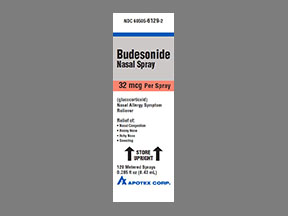
Eq Budesonide Nasal Coupons & Savings Card – Discount Prices from $4.58
Brand for: Budesonide
My prescription
Edit
8.43ML of 32MCG/ACT, Budesonide (1 Bottle)
Select pharmacy

Walgreens
$4.58
COUPON PRICE
Albertsons
$20.02
COUPON PRICE
Walmart
$24.03
COUPON PRICEEq Budesonide Nasal savings card
Show this card to your pharmacist
Walgreens
$4.58
BIN
ID
PCN
GRP
015995
LHKPX306964
GDC
DR33
Powered by
More prescriptions for nasal congestion
More prescriptions for nasal congestion
Eq Budesonide Nasal (Budesonide) dosage forms
Dosage Quantity Price from Per unit 8.43ML of 32MCG/ACT 1 Bottle $20.80 $20.80 8.43ML of 32MCG/ACT 2 Bottles $38.98 $19.49 8.43ML of 32MCG/ACT 3 Bottles $50.97 $16.99
| Dosage | Quantity | Price from | Per unit |
|---|---|---|---|
| 8.43ML of 32MCG/ACT | 1 Bottle | $20.80 | $20.80 |
| 8.43ML of 32MCG/ACT | 2 Bottles | $38.98 | $19.49 |
| 8.43ML of 32MCG/ACT | 3 Bottles | $50.97 | $16.99 |
What does budesonide do for the nose?
Budesonide is a corticosteroid that helps reduce inflammation in the nasal passages. It is commonly used to treat symptoms of allergic rhinitis, such as nasal congestion, sneezing, and runny nose. By decreasing inflammation, budesonide can help improve breathing and alleviate discomfort associated with nasal allergies.
What is the most common side effect of budesonide nasal spray?
The most common side effect of budesonide nasal spray is nasal irritation, which may include symptoms such as dryness, burning, or stinging in the nose.
Is budesonide nasal spray better than Flonase?
The effectiveness of budesonide nasal spray versus Flonase (fluticasone propionate) can vary depending on the individual's specific condition and response to treatment. Both are corticosteroid nasal sprays used to treat nasal allergy symptoms. Some individuals may find one more effective or better tolerated than the other. It is important for patients to consult with their healthcare provider to determine which medication is more suitable for their needs.
Can I use Flonase and budesonide together?
It is generally not recommended to use Flonase (fluticasone) and budesonide together without consulting a healthcare provider. Both medications are corticosteroids and using them concurrently may increase the risk of side effects. A healthcare provider can determine the most appropriate treatment plan based on the individual's specific condition and needs.
What does budesonide do for your sinuses?
Budesonide is a corticosteroid that helps reduce inflammation in the sinuses. It can alleviate symptoms such as nasal congestion, runny nose, and sinus pressure by decreasing swelling and irritation in the nasal passages. This can improve breathing and provide relief from sinus-related discomfort.
